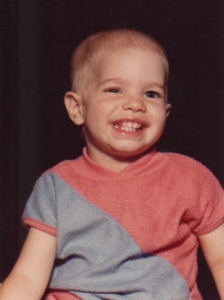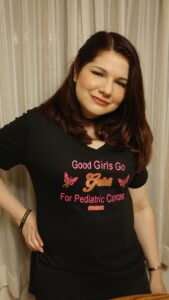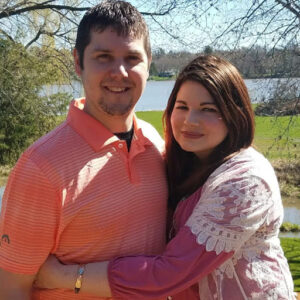CAC2 Member Blog–Lessons Learned from a Childhood Cancer Survivor
By CAC2 Member Mariah Forster Olson, Neuroblastoma Children’s Cancer Society
As a long-term childhood cancer survivor with numerous late effects, I have had 39 years of experience in the medical field…as a patient. As many of us know, life consists of doctor appointments, blood work, diagnostic tests, procedures, surgeries, and more. All of this can be incredibly difficult, exhausting, and depressing, but I have learned some important and valuable life lessons as a childhood cancer survivor.

On June 6, 1980 at the age of one, doctors found a large tumor that occupied the entire right side of my chest. The tumor grew out of my spine, wrapped around part of my heart, and pushed against my trachea and lungs, making it difficult to breathe. After several misdiagnoses, doctors diagnosed me with neuroblastoma, which is a type of childhood cancer that consists of a solid tumor originating in nerve cells. Neuroblastoma is the most common type of childhood cancer in infants and children under the age of five, as well as the leading cause of cancer-related deaths in this age range.
My first surgery was done immediately, but the tumor was too large and intricately involved to remove. After several rounds of radiation treatments to shrink the tumor, doctors were able to remove most of it during a long, complicated second surgery. After that surgery, I had more radiation treatments, and I began two years of chemotherapy. At the time that I was diagnosed, the severity, location, and advancement of the tumor made my cancer very difficult to treat successfully, and I was given a fairly low survival rate. However, a new, experimental chemotherapy protocol was presented as an option that could raise my odds of survival. The only part of my cancer treatments that I remember is chemotherapy because of the brutal nausea. Furthermore, I did not have a port, so each chemotherapy treatment typically consisted of multiple needles sticks to hit a vein; once, it took seven tries! My last chemotherapy treatment was on my 3rd birthday, and after a barrage of testing to determine the success or failure of the cancer treatments, my oncologist said: “What can I say, everything looks just great. She is one of the few lucky ones. Sometimes it really works.” He then brought in other medical professionals to show them what a “success” looked like, since so few children survived a cancer diagnosis at that time.
The treatments worked, and at the age of eight, I was finally pronounced cancer-free! I am so appreciative that I survived, but it is important to note that although childhood cancer occurs during childhood, the effects of it can last a lifetime. My cancer and treatments left me with numerous secondary medical effects, also called late effects because they can occur months to many years after cancer treatments. My late effects consist of around 100 different diseases, disorders and medical conditions. I have also had 44 surgeries and I am at risk for eight different secondary cancers. Furthermore, I suffer from chronic, excruciating bone, muscle, and nerve pain in my neck, upper and lower back, and cancer scar area. The pain is from the cancer and radiation, severe scoliosis, and multiple back surgeries resulting in the complete fusion of my entire back, except for my neck.
It is a bit difficult for me to talk about all of my late effects because I like to try to hide them so that people see ME, as opposed to a bunch of medical conditions. I also strive to maintain a positive, happy perspective, and I do not want to be seen as complaining. However, I do not want you to think that I am always a positive, happy, bubbly person because I can have difficult days with depression and anxiety, and feelings of worthlessness and despair! Yet, it is more difficult to conquer these feelings the longer that I have them, so I try to learn what I can and fight to move on as soon as I am able.
 I believe that difficult experiences and hardships in life can lead to incredible wisdom and teach us valuable lessons, and this belief has really enriched my life and propelled me through difficult situations. Many of us experience pain and difficulties in life, but it is how we respond that is important.
I believe that difficult experiences and hardships in life can lead to incredible wisdom and teach us valuable lessons, and this belief has really enriched my life and propelled me through difficult situations. Many of us experience pain and difficulties in life, but it is how we respond that is important.
You can choose to let it get you down and let it define your life in a negative way, or you could use it to learn valuable lessons and focus on what you do have in life and what you can do to help others! A key lesson that I have learned is to focus on hope, optimism, and positivity. Having a young child dealing with cancer and survivorship, my parents liked to extol the virtue of Norman Vincent Peale’s book and belief in, “The Power of Positive Thinking.” Peale, an American minister and author, believed that anyone could prevail over difficulties in life with positivity, optimism, and hope. Although you cannot change the fact that cancer is or has been in your life, you can strive to change how you think, respond, and deal with it. Even on the most difficult days, amidst anger and depression, there is something positive to be found, and changing your perspective can be incredibly powerful. Personally, I try to challenge myself to find that “silver lining” in any situation, whether it is during or after a particularly difficult time. It can be something as simple as a kind word or a smile, or learning how much your family and friends love and support you. In addition, injecting a little humor into life has multiple benefits, but it also simply feels good to laugh! Laughter and humor can bring about joy and happiness, which can make it a little easier to achieve positivity, optimism, and hope.
Another important lesson that I have learned is that I need God and my faith to help me through the difficult moments in my life, especially on the days where it feels next to impossible to be strong. My faith has also helped me maintain a positive, optimistic, hopeful mentality and perspective on life. Believing and praying to a higher power provides my anxious, worrying mind with a sense of peace, and it is very comforting to know that I am never alone and there is someone guiding me through the twists and turns of life.
The love, help, support, and comfort of my “inner circle”, which consists of my husband, my parents, my best friend, and my two therapy cats, is another key component in my life. These people (and animals!) know absolutely everything about me, love me unconditionally, and I am able to talk to them about anything. It is so important to have at least one person that you can talk to and truly be yourself, whether that person offer advice, or they simply listen and silently offer comfort and support. Talking to someone can help put issues into perspective, but more importantly, it allows you to take care of yourself by getting your thoughts out and feeling less alone.
I am very blessed to have a Bachelor’s Degree in Political Science and a Master’s Degree in Business Administration, however my medical issues and pain have compounded and worsened significantly since college so I do need to rest often. This does not allow me to work a “conventional” job, yet I still strive to be productive so I work from my couch on my laptop, with my two cats lying next to me! I am writing a book about my cancer experiences, my late effects and other medical issues, my philosophies on life and positivity, and how I am making it through this long, difficult ordeal. I also play the oboe professionally in a variety of ensembles in my community.
One of my desires in life has been to fight childhood cancer and to help patients, survivors, families, and caregivers. Practicing gratitude and helping others is so important, and I try to accomplish this through my work with nine different cancer-related nonprofits. I have had some amazing experiences doing this work, but more importantly, I finally feel like I am doing what I am supposed to be doing with my life! Through my work, I communicate with families and patients going through childhood cancer, as well as survivors, and I also do research, write, speak at events, raise funds, advocate, and spread awareness about childhood cancer for various organizations. I lead the survivorship interest group for the Coalition Against Childhood Cancer (CAC2), and I am on the Board of Directors for that organization, as well as for the Neuroblastoma Children’s Cancer Society. Additionally, I am on the State Leadership Board for the American Cancer Society, and I have had some amazing opportunities as an ambassador for the American Cancer Society Cancer Action Network (ACS CAN), lobbying for both state and federal cancer-related legislation. This year, I was sent to Washington, D.C. for multiple lobby days, I spoke at a congressional briefing, and I made a television commercial for an ACS CAN initiative. My ultimate goal in life has always been to help people, and I truly hope that this what I am doing with my nonprofit work.
When life is not going quite right, and I am experiencing incredible amounts of pain or my medical conditions are exacerbated, I try to remind myself that I survived childhood cancer at a time when many others did not. It will be 40 years from my cancer diagnosis in June, and I have fought to not only be a survivor, but also a “thriver”, despite my many medical conditions and chronic pain. All of these experiences have taught me incredible lessons about life, including hope, optimism, positivity, humor, faith, having an “inner circle,” gratitude, and the importance of doing meaningful work. Furthermore, I learned that hope, optimism, and positivity can exist in difficult situations and moments of despair. It is my wish that you, too, can incorporate some of these lessons learned from a childhood cancer survivor into your own lives.

With appreciation to our friends and partners at Elephants & Tea for allowing us to share this blog post. We encourage you to visit E&T and read more compelling stories like Mariah’s. Sharing is caring.
Categories
- Blog Posts (91)
- Explainer Post (11)
- Guest Blogs (15)
- Member Blogs (37)
- Survivorship Matters Blog (9)
- CAC2 News (25)
- Collaborative Achievements (13)
- Community News (233)
- In Memoriam (2)
- News Digest (186)
- Webinars (64)
Tags
Recent Posts
- CAC2 Childhood Cancer Community News Digest (July 15-21)
- CAC2 Collaborative Achievement–CAC2 Members Build Framework for Advancing Pediatric Cancer Research and Drug Development
- CAC2 Childhood Cancer Community News Digest (July 8-14)
- CAC2 Childhood Cancer Community News Digest (July 1-7)
- NCI Advocacy Update